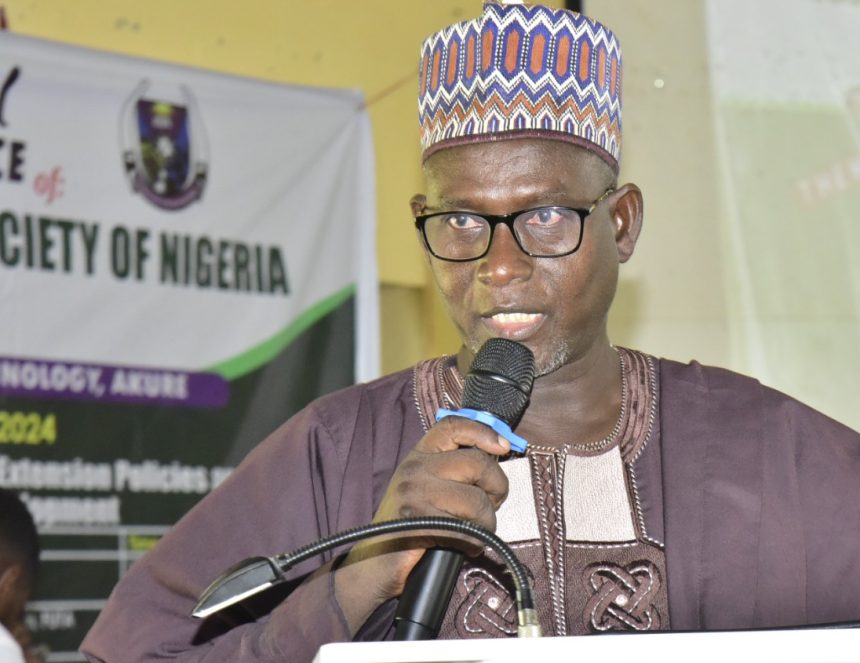Experts have canvassed the integration of Artificial Intelligence and emerging relevant technological innovations into agricultural extension practices in order to improve agricultural production and firm up the drive for food security.
This was the fulcrum of opinion at the Agricultural Extension Society of Nigeria (AESON) 29th Annual Conference, which was held from April 21st to April 24th, 2024, at the Federal University of Technology Akure (FUTA).
At the conference, with the theme, “Leveraging the Dynamics of Agricultural Extension Policy for Sustainable Development,” participants reiterated the need to reinvigorate and unleash the potential of technology by efficiently mobilizing resources for full exploration of e-Extension services to boost all facets of agriculture.
Setting the tone for the conference, the President, AESON , Professor Yusuf Idrisa, said, “Through the annual conferences, the society has brought together extension practitioners and academics in the field of agricultural extension to generate and share ideas for moving agricultural extension practice forward.”
One of the major highlights of the gathering was charting a pathway to tackle the problem of food availability and affordability bedeviling the country. Participants noted that, given the current realities of serious concerns over feeding Nigeria’s teeming population, governments at all levels keyed into several global initiatives and launched policies to ensure food security.
They said the various initiatives to boost agriculture and food security can only be realizable if there is a synergy with experts in agricultural extension services as they are in a vantage position to leverage this opportunity to enhance the Agricultural Extension Policy for Sustainable Development.
Idrisa said the National Agricultural Growth Scheme (NAGS) of the Federal Government was commendable, but its goals would become more realizable if AESON had the opportunity to play its deserved role in the programme. They therefore canvassed that “research extension linkage should be reinvigorated by massive recruitment of extension personnel across agricultural development programmes and associated agencies in states. The current practice of ad-hoc staff in several nomenclatures by governments at all levels is not acceptable, unsustainable, and can only be counterproductive.”
Other recommendations proffered at the conference include the deployment of e-extension systems and Artificial Intelligence (AI) for agricultural production systems, as these tools are still not maximally exploited.
Additionally, all international proclamations regarding climate change mitigation should be implemented by governments at all levels in Nigeria by promoting the adoption of climate-smart practices and training Nigerian farmers to enhance the quality and quantity of food production in the country. There was also a call for partnerships between extension personnel and research institutes for innovative processes and linkages that can increase agricultural yield.
In her address, the Vice Chancellor of FUTA, Professor Adenike Oladiji, who was represented by the Deputy Vice Chancellor Academic , Professor Taiwo Amos, noted that several challenges facing agriculture in Nigeria have remained with us for decades. According to her , the problems include the low application of modern technology and low productivity, as well as poor storage facilities, among others.
Professor Oladiji said , “Solutions had been found to most of the problems but the gap between the researchers and the farmers seemed to have remained. That is why the Agricultural Extension experts should be given all the necessary support to play their roles effectively and efficiently.” Professor Oladiji pointed out that ” this is necessary not only for the production of food crops but also for all agricultural practices that add value to the economy.”
Delivering the keynote address, Project Director, ACCLAWA, International Labor Organization Dr. Agatha Kolawale highlighted actions to ensure sustainable agricultural development in Nigeria to include adoption of a legal working age, promotion of recent work for youths of legal working age , social protection, provision of funds for entrepreneurial development, and mitigating economic vulnerabilities associated with child labour.
She said youths play a significant role in promoting technological innovations in agriculture and must be equipped with sound educational training so that they can effectively contribute their quota to agricultural development in the country.
In good will, message the Ondo State. Commissioner for Agriculture and Forestry, Hon. Olayato Aribo said the government will always give unalloyed support to agricultural activities through mobilization and subsidized inputs.
On his part, the Conference Coordinator , Professor Olaniyi Okunlola of the Department of Agricultural Extension and Communication , FUTA said the aim of the conference was to equip participants with knowledge that would further enhance their understanding and ability to address contemporary issues in Agriculture.
Five members ,Senator Prof. Anthony Ani, Professor Kuta Yahaya, Dr. Oluwole Akinnagbe Dr. Fadullah Isah and Dr. Philip Ifejika were conferred with the fellowship of the Association during the conference.






